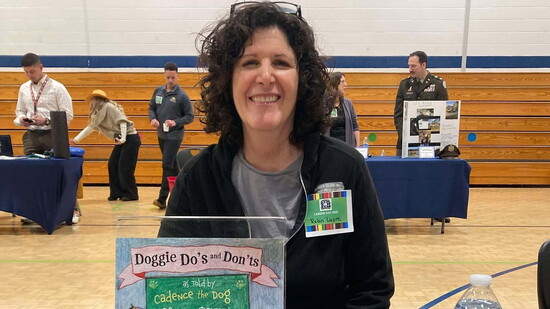For animal advocate and author Robin Lapre, caring for dogs and cats is more than just a passion. She’s a powerful voice for the animals who can’t speak for themselves. Her outreach efforts have inspired pet lovers to adopt, foster, and stand up for better animal welfare policies. Whether she’s at a shelter, speaking at an event, or writing her next book, Lapre's goal remains the same: to ensure every dog and cat is treated with the compassion and dignity they deserve.
What first sparked your passion for animal advocacy?
I started walking dogs at Williamson County Animal Center in 2017, and I was soon hooked on the notion that we needed to help as many homeless animals as possible, not just in Williamson County but in other counties as well. Over time, it became clear to me that we needed to do much more education in our communities about responsible pet ownership.
Can you share the story of one animal that had a particularly profound impact on you?
Beatrice was a dog that came from a property with twenty-six dogs, all living outdoors, none of them altered. I tried for months to socialize her, but Beatrice was considered “semi-feral,” meaning she missed a key developmental window when she could have learned to form trusting relationships with humans. Her owner was not a bad person, but lacked basic knowledge regarding animal welfare. This is a prime example of why we need to engage in education, not only to help individual animals but to reduce the strain on our animal control agencies that handle these unfortunate situations.
What do you believe are the most pressing issues facing animal welfare today?
The most urgent issue pertaining to companion pets is the overpopulation of cats and dogs and inadequate rates of spay/neuter. There are many reasons why people don’t fix their pets including the expense, long waits, a lack of awareness, and a failure to make spay/neuter a priority.
What does a “day in the life” look like for you?
A “visiting author” day entails driving to any school within a 100-mile radius of Franklin. Typically, I speak to multiple grades which allows me to reach hundreds of students in a single day! I am always impressed by the quality of the questions and the compassion kids have for their pets. At home, I manage three dogs of my own, and I have a side gig as an urgent care physician, so no, I did not quit my day job!
Tell me about your books.
I struggled to find books that tackled essential issues, so I bit the bullet and started an original collection under the nonprofit Charlie’s Angels Saving Animals (CASA).
Doggie Do’s and Don’ts as Told by Cadence the Dog covers many aspects of responsible pet ownership. This book is the basis for our school presentations, and we’ve been thrilled to see it incorporated by humane societies across the country.
Two Frisky Kittens: How to Count High Real Quick is a book about the perils of unaltered kittens. It covers essential messages of spay/neuter in a way that kids can understand and enjoy. As with all of our books, it comes with additional information to make lessons easy for educators.
I Like Kibble and So Much More! will be released in August and is a light-hearted book on nutrition for dogs.
What advice would you give to someone who wants to speak up for animals but doesn’t know where to begin?
Reach out to your local shelter or rescue. You might be surprised that you can help in numerous capacities beyond walking dogs. If you observe a concerning situation in the community, contact animal control. They will conduct a welfare check to be sure conditions are adequate for animals.
What’s next for you—any upcoming projects, additional books, or community initiatives you're excited to share?
We are just getting warmed up. More books are coming through the initiative known as CASA PAWS (Promoting Animal Welfare Stories). You can read about our mission to educate at CasaTransport.org/education
"It became clear to me that we needed to do much more education in our communities about responsible pet ownership."
